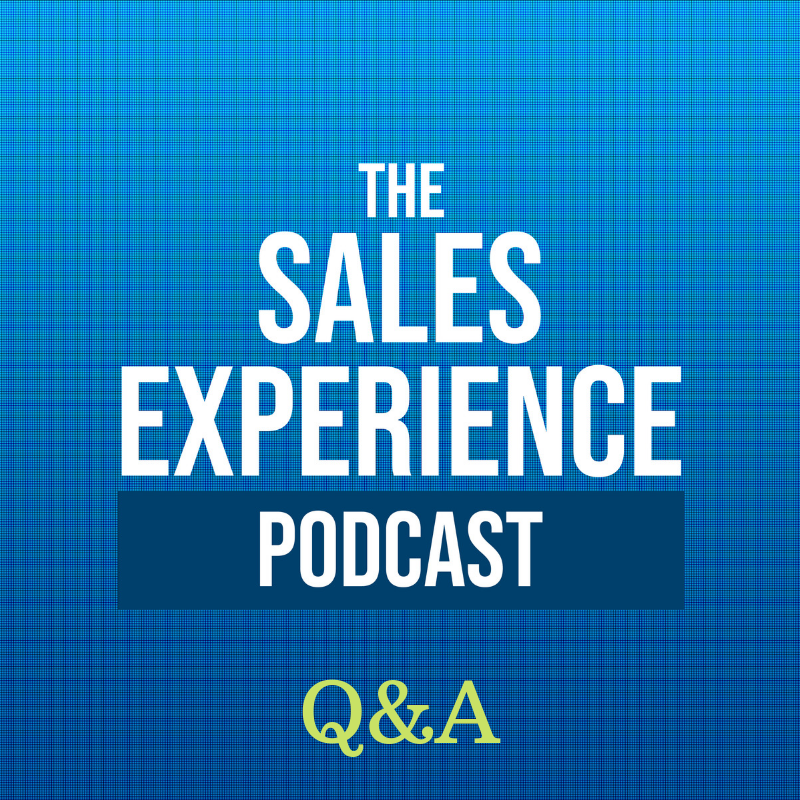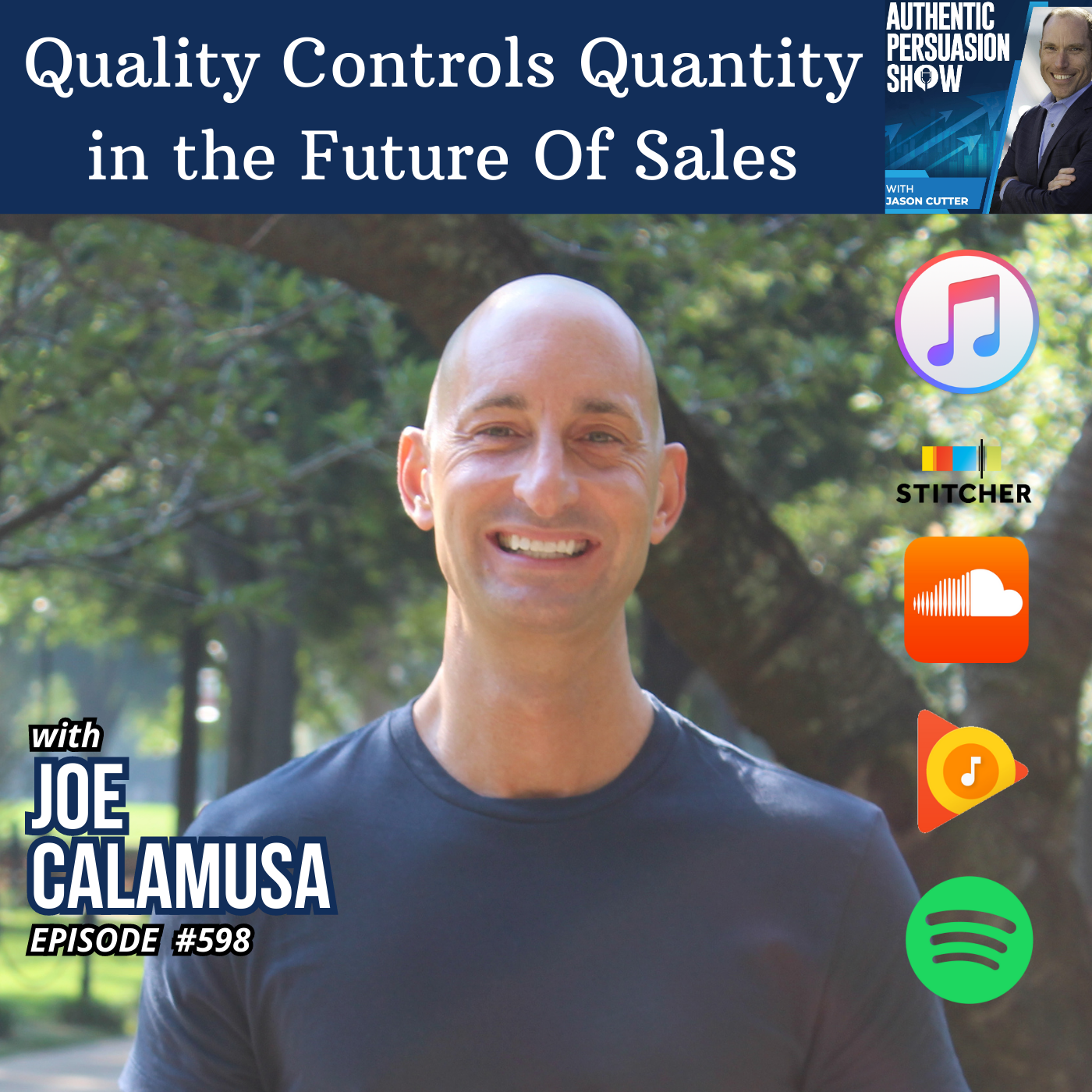Show Notes
Week 19, time to talk about sales technology – your ‘tech stack’.
A lot of companies will try to talk you into their software that is meant to ‘help’ your team close more deals, but will it?
In this episode, I cover the purpose of sales technology for your team and for management.
Fundamentally the one thing it should do is allow your salespeople to focus more on what they are good at (talking with prospects and moving them towards the close) and less on what they might not be good at or don’t want to deal with.
Episode 91 – Transcript
What’s going on. Thanks for tuning into the sales experience podcast.
My name again is Jason Cutter, so glad that you’re here. This is week 19 if you’re new to the show, this is going to be a fun one about sales technology. If you’re a long time listener, I appreciate your support. I appreciate the comments, the reviews, the ratings, the messages that I get, and if you want to get in touch with me, please make sure to go to Keter consulting group.com you can fill out the form there or you can find my contact info and reach out to me.
You can also find me or the show on LinkedIn. Send me a message through there. I appreciate everybody who’s been doing that for this week. I want to cover sales technology. Now. What is sales tech, the tech stack, all these words and terms that people use and sound really fancy, but what is it?
Well, fundamentally sales technology is anything that helps a salesperson be more effective at their job. On one end of the scale. In my mind, sales technology includes scripts. Even if that script is printed and handed to you, the salesperson or as a manager, you’re handing this out or putting it into your system, even if it’s just a printed version that is sales technology, a lead sheet that used to be filled out by hand by Penn for the Rep.
Each time they got a phone call. To me it’s sales technology. Now in this day and age especially where I live near Silicon Valley, everything is tech-based. Everything is systems and AI driven and fancy. The challenge with that is that a lot of times you don’t know where to begin. If you’re a sales leader or a manager and organization, where do you start? What do you put in place?
How can you help your reps and if you’re a salesperson, the last thing you want and what you’re afraid of most is having more things to deal with. My guess based on over 16 years of dealing with salespeople and teams and technology and companies of various sizes and various verticals, is that fundamentally salespeople don’t like using technology.
Now, what does that mean? They don’t necessarily like using the CRM. If you’re a sales person, you already know this, that you just want to be on the phone or in person closing deals. You don’t want to have to fill out paperwork. You don’t want to have to fill out forms.
You don’t want to have to fill in details in the CRM, whether that’s salesforce or hub spot or whatever it is that you’re using. All you want to do is have conversations. And so the thought of sales technology might make you feel concerned or anxious because what you don’t want is one more thing.
All you need is a phone and some people to talk to and that’s literally at anything else. It’s just gonna get in the way of what you want to do. You’re in sales not to manage [inaudible] technology, a process, a pipeline, all these leads, you’re in sales to close deals. Am I right?
Like if you’re listening to this, you know that’s correct, at least for most of you. Again, this is based on a ton of experience. Now, of course, there are salespeople out there who love technology and entering the information and tracking their leads and their pipeline and they have whatever the CRM is, plus they have a spreadsheet or a notepad where they’re keeping track of it.
Those people, the true sales professionals understand the value of all this technology for others, especially if new [inaudible], all of this things that get in the way or cause confusion or keep you from just having the conversations that you want to be having now as a manager of a sales team or an owner of an organization with a sales team in it, technology is your biggest fight against the war of the unsalable.
What do I mean by that? Well, if you’re in sales management, you know this, if you have five reps on the phone all day, every day, and let’s say they’re on the phone five hours a day, that’s 25 hours of phone calls.
Assuming those calls are recorded and you’re one person, that means you would have 25 hours of calls to listen to so that you could focus on what’s missing, what they’re doing well, what you can coach on, the strengths, the weaknesses of each person on your team, each interaction, and then get them to the winning point.
Like I covered very early on in the sales experience podcast, I think it might’ve been week two talking about watching film. If you’re a professional sports team, there’s the player on the field, there’s the coach, and then there’s a whole team of people taking all of that footage from the game and putting it into bits and then letting you watch that as a summary form or go through it.
No. In a football game for example, it might be 60 minutes, there’s going to be 60 minutes of clips minus a lot of filler things and that’s once maybe per week that you’re doing it. The problem for salespeople, sales managers is that you’re playing this game every single day [inaudible] all day games and so technology is your important tool to help you scale the unsalable.
What’s unsalable [inaudible] unsalable is listening to every call watching everything the reps do, managing the whole process, distributing calls where it needs to go, watching the leads, all of that is unsalable and we’re talking if you have a team of two reps, but imagine if you have a team of 50 or 20 or a hundred then that just becomes impossible.
So the last thing you want to do is have to scale up the number of managers for the team just because you’re adding more reps and this is where technology comes into play.
The nice thing is in 2019 there’s so much stuff that’s automated and that can help you do what you do best as a sales manager as well, which is coaching, leading, correcting training, building up your team, helping them set goals, and then holding them accountable for those numbers.
So when the rest of the episodes this week I’m going to talk about technology and various areas that would help you as a sales manager or an owner of a team with your reps and making sure that you get the most productivity out of them. Now it’s not necessarily about doing their jobs for them. Really the goal is to fill them [inaudible] as many of the gaps as possible to help them stay in their sweet spot.
What is their sweet spot? Ultimately, you want your salespeople to be spending most of their time in interactions with prospects, moving them to clients, whether it’s phone calls, whether it’s face to face visits.
Do you want to try to eliminate or reduce as much of the time possible on emails, follow-up, nurturing things? Now let’s address the giant elephant in the room when it comes to sales technology. The biggest factor that I see and what you’re probably thinking, if you’re a sales manager, listen to this [inaudible] who is going to implement this? Who’s going to run it? And I already don’t have time for this.
That’s the biggest issue with this theory, with this possibly putting in more stuff, is that you’re already busy. Your team has already busy. No one has time for this and fundamental, you know, they don’t like change and so who’s gonna run this?
The first thing I would say is that make sure as you’re going through and you’re adding these things to your tech stack, which is a fancy way for just saying the technology that you’re using as you’re adding and building up your sales technology stack.
Just take it one bit at a time. Add one thing, get that running smoothly and then add another. Make sure you’re playing a long game. Now the challenges is that there’s a lot of cool things you can implement. There’s a lot of great things that you want to put in place right now.
Throw it the team, fix all the holes that you can and plug everything that you can so that everyone’s working better. The challenges, that’s not reasonable. You got to focus on one thing at a time. Second, a lot of the companies that I’m going to suggest I have paid product placement with, so none of them are paying me to endorse them in any way.
However, what I would say is that most of the companies that [inaudible] I have vetted and talked to have implementation. They will help you. They will roll it out with you.
They’ll make it easy so they’re not just handing you this kit, this puzzle that you have to put together and then roll out yourself. Third, I would say if there’s anybody in your organization that’s tech savvy, maybe you have a tech team in house or outsourced, whatever it is, you can get them on board to roll these out one at a time.
The key with all of these tech items is to make sure that they fit in well with your other items, whether it’s your CRM, your phone system, whatever you have in place. Because the last thing you want to do is add another component onto everything that you’re already trying to manage.
The last thing you want is another piece of technology you have to open up and run. The best thing you can do is have things that are either natively built into what you’re already using.
So if you’re using salesforce, then what widgets can you plug into that? So that’s all built into one, so it’s not external with another thing that you have to use for reporting and logging in and then making sure that it runs really smooth. And then lastly with this, if you do need help with any of these, as you’re listening, you can reach out to me as well.
So I’m familiar with all of these things that I’m talking about. I’ve rolled them out in various ways, whether it’s the companies that I suggest or even the technology in general. A lot of times it’s the basic principles of what is available, what I cover that would help your sales team. Those basic principles can be applied in different ways or can come from different sources. So if you know how to fix a car, then basically tools will help.
Fancier tools are great, but you just need to know the fundamentals on how to fix that car. And then you can use whatever you’re given. I’m not going to say full on MacGyver mode, but sometimes it comes to that where problem and you know what the solution is that you want to get to.
Then a lot of times it’s taking all of the parts that you can put in together and make it successful, a cohesive system. And again, if you need help with that, reach out to me. [Inaudible] consulting group.com you can send me a message where they are or find me on LinkedIn. Super easy. We can get on a call, have a conversation about the sales technology.
That’s it for this episode. Make sure you do rate and subscribe to the show. Catch the rest of the ones this week as I go through the tech stack. Do you have any questions about your tech stack or your team looking for coaching, training, consulting, wanting to turn around the current team you have or build out a new team. Make sure to reach out to me.
Always, remember that everything in life is sales and people remember the experience you gave them.
![[E91] Sales Tech Week: Using technology to enhance your sales team](https://episodes.castos.com/salesexperiencepodcast/images/TSEP-Cover-Sales-Tech.png)


